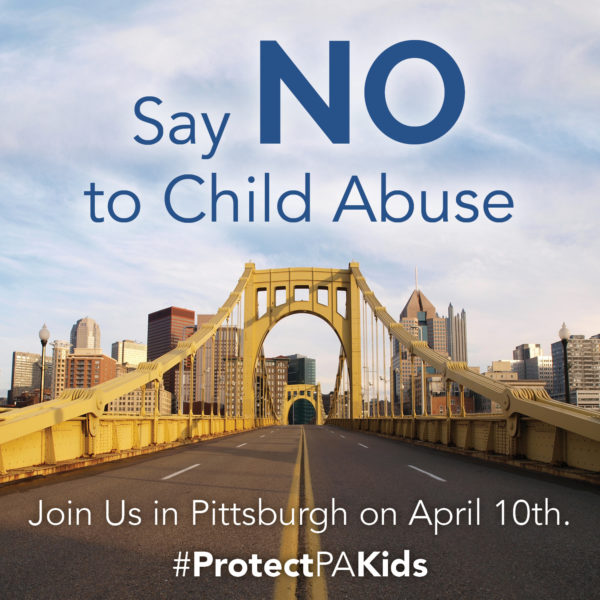
How can we prevent child abuse? Through daily acts, big and small
Walking Downtown this month, you may spot little blue and black flags sprouting up among the crocuses and daffodils. For two weeks, those 4,733 flags will stand as a sobering reminder of the magnitude of child abuse in Pennsylvania. Forty black flags will memorialize children who lost their lives to abuse and neglect in 2017. The 4,693 blue flags symbolize children who are currently suffering.

As difficult as the statistics may be to comprehend, says Angela Liddle, president and CEO of Pennsylvania Family Support Alliance (PFSA), raising awareness of the realities of child abuse is what ultimately changes people’s behavior.
“Through daily acts—large or small—they make a difference,” she says. (Find examples in sidebar below.)
“We want people to be concerned and move toward action,” Liddle says. “When you see how kids are treated in public, it can be very concerning for any of us — but not everything is a phone call to ChildLine. Some families just need support.”
PFSA plays an important role in providing families and caregivers with support. The agency offers statewide community awareness and prevention programs and resources on spotting the differences between discipline and abuse, parenting while in recovery from a substance-use disorder, and guidelines for reporting suspected abuse.
Another important piece of the puzzle, says Liddle, is for top state officials to lead by example, “encouraging all citizens to fulfill their social responsibility of protecting kids.”
A free, public flag-planting ceremony, hosted by Pennsylvania Family Support Alliance), is planned for April 10. This marks the third year for the event, which took place in Harrisburg the first two years. Fittingly, the ceremony is timed to Child Abuse Prevention Month.
Allegheny County Executive, Rich Fitzgerald and Department of Health and Human Services Director Marc Cherna will be among the special guests appearing at the April 10 ceremony, alongside children from Pittsburgh Creative Performing Arts School (CAPA) and Boys and Girls Clubs of Western Pennsylvania. Pennsylvania Second Lady Gisele Fetterman will take part, too.
“The Fettermans are strong advocates for kids,” says Liddle. “They have a heart for children.”
During the ceremony, PFSA will present the PA Blue Ribbon Champions for Safe Kids award to Kristen Glass, a licensed social worker at crisis childcare center Jeremiah’s Place, and Dr. Mary Carrasco, founder of A Child’s Place at Mercy Hospital.
The award honors individuals who work professionally in the child welfare field, as well as those who volunteer to keep the children in our communities safe.
Liddle hopes attendees will “sit back and say, ‘Wow, I can do that too.’ ”
How to help: Daily acts, big and small, to keep kids safe
The Pennsylvania Family Support Alliance offers these tips for developing a safe community for kids.
Take the first step. If you don’t know the names of the families who live around you, be bold and introduce yourself. Then write down their names to help you remember.
Welcome newcomers. Take the time to welcome new families and get to know something about them and their interests to build a foundation for a good relationship.
Plan neighborhood celebrations and get-togethers. Give people time to get to know each other informally. Be sure to offer name tags to help people learn or remember names.
Celebrate with families. When you learn there’s an upcoming birthday, graduation, or other milestones, take a minute to offer congratulations or to send a note.
Ask for a little help from time to time. Invite neighborhood kids to give you a hand with an outdoor project and thank them for being a good neighbor. The act reminds kids that they are an important part of the neighborhood. It also increases the chances that a neighbor will ask you for help when needed, helping create a supportive community culture.
Keep an eye out for neighborhood kids. Let parents know when their kids do something positive or fun. “I heard your son playing drums yesterday. He’s really getting good.” If you have concerns, raise them with care as a supporter. Knowing that neighbors are keeping an eye out for your family is an important community support.
Find connections with families. Once you discover shared interests and passions, it will be easy to discover ways to spend time together, become friends and be supportive resources to each other.
Consider sponsoring the Front Porch Project® in your community. The Front Porch Project is a community-based primary prevention initiative that provides people with the knowledge, training and encouragement they need to become involved in preventing abuse and neglect before it occurs.